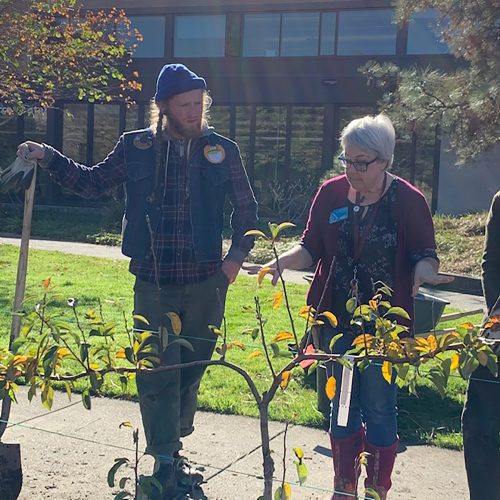This content was published: April 7, 2020. Phone numbers, email addresses, and other information may have changed.
Coronavirus is not slowing down Cascade’s new learning garden or its coordinator
Photos and Story by Abe Proctor
Jolie Donohue isn’t letting the current COVID-19 (coronavirus) pandemic slow her down from teaching.
Donohue is the coordinator of the Learning Garden at Portland Community College’s Cascade Campus in North Portland. Her duties include those typically associated with gardening, like planting, harvesting, and rotating the crops, dealing with pests, and more, but the job carries a deeper meaning and purpose for her: advancing the food justice cause.
Even though PCC is operating remotely through spring term, Donohue isn’t cancelling her garden learning. She has looked for creative ways to virtually engage the college community through the garden. As a result, she has put together a learning garden “Lunch Bunch” group via an online meeting platform. This is a free gardening discussion group open to all students, staff, and faculty with any level of gardening experience. The discussions are one hour each week, or twice a week during Earth Week.
COVID-19 Resources
- PCC has moved to remote operations for spring term. The college has put together resources for students and staff related to the college providing online classes and services.
She first launched the “Lunch Bunch gatherings as classroom presentations where attendees are invited to bring a lunch and learn about gardening concepts and practices. A session in early March, for example, addressed cool-season vegetable crops — basically, what you should plant in your garden during March and April. Even now, as people are home in isolation, focusing on their gardens is a healthy option to stay busy.
For a full schedule of the virtual “Lunch Bunch” gatherings, visit the Cascade Learning Garden webpage.
Donohue is also recording gardening videos at her home and posting them to the garden’s Instagram page and is answering questions via email from staff and students. She is planning a virtual Earth Week lined up with her campus’ “Green Team,” and is organizing virtual professional development with faculty.
Dedicated to Food Justice
Donohue’s focus is food justice, which is not a complicated concept.
“There is a huge disconnect between people and where their food comes from and this is a problem,” she said. “It means having adequate, healthy, accessible food. It also means having food that is culturally appropriate — food that is important to someone’s family, culture, and place of origin. Modern food production has a disproportionate negative effect on communities of color.”
The lack of food justice, particularly in traditionally underserved communities, is a real problem, and more pervasive than one might think, she added. The economic incentives built into our industrial food system can mean that the least expensive and most readily available calories are also the least nutritious. Because of the persistent lack of services in many poorer communities, people are often forced to travel long distances to find fresh, organic, non-processed foods, or simply to go without.
Donohue said this is the essence of food justice. But it’s a situation that can be directly and simply addressed by the very thing she’s modeling through Cascade Campus’ Learning Garden by growing food in an urban setting.
“What I’m trying to do with the learning garden is demonstrate the things that people can do at home,” she said. “People can be very surprised, and empowered, to learn that they can grow food in even a limited space, good, nutrient-dense foods, and they can learn to save the seeds for their next crop. It can be lifesaving for people.”
Early Days of Garden
The values of food justice have been instilled in Cascade’s garden from its inception, thanks to the garden’s first coordinator (Donohue). Early on, she met with members of the college’s student leadership to brainstorm a list of culturally appropriate foods to plant, and has continued to expand the garden’s offerings based on suggestions from students.
“Every month, something new goes in,” Donohue said.
Recently, as one might expect, the garden has featured a range of winter crops, which Donohue and her cadre of volunteers planted at the tail end of summer. Year-round gardening, she explained, is an important tenet of food justice, as it helps to sustain people during the annual “hunger gap” period of January through March, when harvests typically yield the least.
Donohue said the most rewarding part of her job and of her commitment to promoting food justice, is when she sees a love of gardening take hold of someone. Many of her students — she’s taught gardening for more than a decade — have stayed in touch over the years.
“They send me pictures of their gardens,” she smiled. “I love nurturing that community.”




So happy that Kendi Esary and Briar Schoon made this happen! So proud!